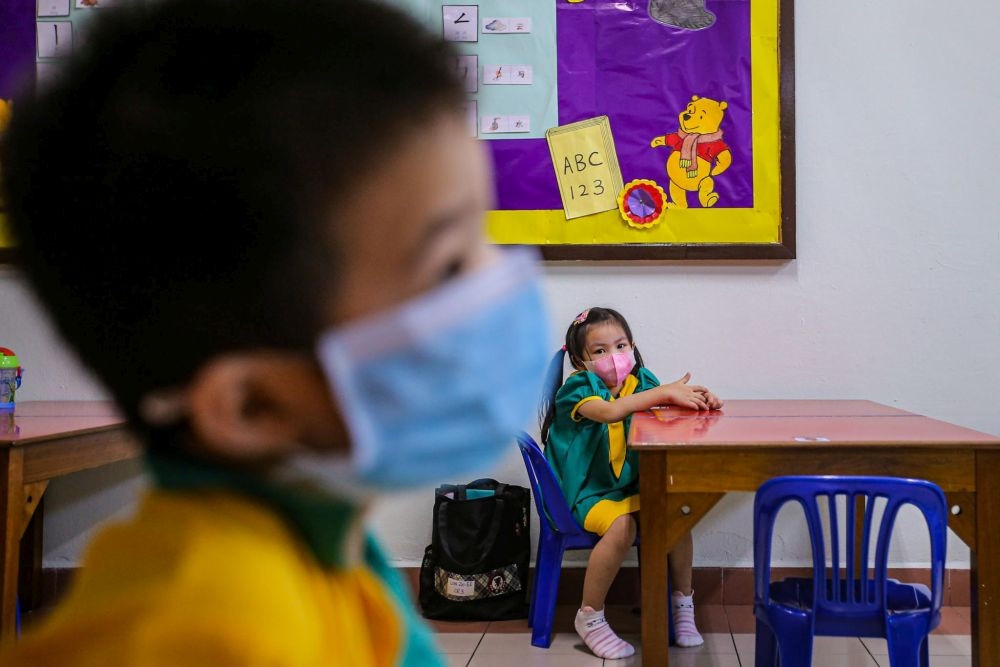KUALA LUMPUR, May 30 — Malaysia continues to grapple with a dearth of quality preschool teachers and other longstanding structural holes that are threatening to upend the education reform drive, the World Bank said in its review of Malaysia’s early childhood education system released today.
Policymakers in Putrajaya came to realise the importance of early childhood education, recognised as one of the most crucial stages in a person’s cognitive and intellectual development, only at the turn of the century, and have poured billions of ringgit to develop infrastructures, training modules and curriculums over the last 13 years.
The World Bank said the third-largest South-east Asian economy had made some progress in developing its preschool system, but remains bogged down by issues of access and quality. It suggested these problems largely stem from the lack of resources even as funding has more than tripled since 2010.
“Findings from the World Bank’s preschool survey and stakeholder interviews carried out for this report point to a range of issues, such as a lack of preschool seat availability in certain areas, low awareness among parents on the benefits of sending their children to preschools, affordability of preschool expenses, low quality teachers and concerns over the overlapping roles between the multiple ministries and agencies that oversee early childhood care and education (ECCE),” it said.
The findings could be a wake-up call for decision-makers in Putrajaya with less than three years left for them to meet all the targets set under the 13-year Malaysian Education Blueprint.
Several of the key goals were not met, the Bank noted. For example, the Blueprint was set to achieve universal preschool enrolment by 2020, and Malaysia, along with many other developing countries, has yet to achieve this. Preschool enrolment in Malaysia did rise, however, from under 67 per cent in 2009 to 84 per cent in 2020.
It had also set a target to have all preschool teachers obtain a minimum qualification of a diploma in ECCE by 2020 but the Bank said the goal was not met, which it attributed to “longstanding obstacles that have yet to be resolved,” although the Covid-19 pandemic could have likely contributed to the setback. The goal is now postponed to 2025.
Prior to 2010 becoming a preschool teacher required little qualification. The prerequisite for a paper qualification came only after policymakers were made to understand the link between early childhood development and learning ability and productivity in adulthood, as a growing number of studies on child education began to emerge.
Putrajaya now understood that a good early childhood education would largely hinge on having highly trained preschool teachers who specialise in ECCE, alongside other factors like good infrastructure and adequate financial support.
But as of 2022, only half of the 22,000 over preschool teachers in the country have obtained a Diploma in ECCE, the World Bank noted, with close to some 73 per cent of them being private sector preschool teachers.
The review also found private preschool teachers tend to have lower academic or professional qualifications compared to public preschool teachers. This is compounded by the limited access courses that could enhance their teaching skills, while these learning platforms are readily more available for public preschool teachers, suggesting a gulf in government support for public and private sector ECCE.
“Accessibility of the diploma programmes, particularly for those residing out of the Klang Valley region and those without internet access, may have hindered teachers from enrolling and completing their studies,” the Bank said, adding that affordability of the diploma programmes remains a challenge, given the relative low wages and inadequate income safety net among preschool teachers.
In the recommendation box, the World Bank said the Malaysian government needs to convey a strong, clear message to all stakeholders about its commitment to ensure all preschool teachers meet minimum qualifications by 2025.
It also encouraged more state funding of programmes for lifelong learning to reinforce the skills preschool teachers have to understand how young children learn and develop, and build relationships with children and their families
“The previous enforcement of the minimum DECE qualification requirement for preschool teachers was weak. There was inadequate implementation and enforcement, and hence the compliance rate from the private sector was low. The government should strongly consider including the minimum qualification into the Education Act,” it said.
“This demonstrates strong political will to elevate teachers’ standards, and helps to ensure better enforcement and compliance in the long run regardless of leadership changes.”
All this would need to be addressed together with other key areas, like financial assistance and more infrastructures.
The World Bank said affordability of school fees and other related preschool costs was among the key reasons hindering enrolment, especially for lower-income families. Findings from the survey, interviews and the preschool lab corroborate the financial issues faced by families in paying school fees and costs related to transportation, uniforms and books.
There is also an urgent need to build more preschools in poorer neighbourhoods and more remote areas. The Bank said the lack of kindergartens in these areas also contribute to poor enrolment.
“Survey respondents reported not just a lack of preschools in remote areas, but also difficulty in accessing these preschools due to their location being far from the villages, requiring a long walk or a boat ride to reach them, due to lack of transportation and road access to them,” it said.





















